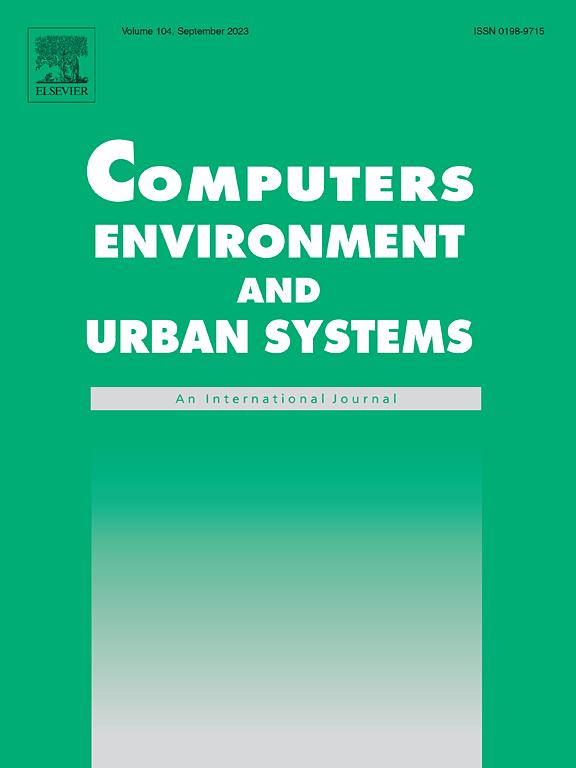A planning support framework to enable smart mobility: Integrating multi-objective spatial optimization and GIS to enhance commuting efficiency
IF 8.3
1区 地球科学
Q1 ENVIRONMENTAL STUDIES
Computers Environment and Urban Systems
Pub Date : 2025-02-27
DOI:10.1016/j.compenvurbsys.2025.102269
引用次数: 0
Abstract
Planning support approaches can play a transformative role in shaping sustainable, resilient, and equitable urban landscapes that promote efficient mobility patterns. This paper develops a prescriptive framework that integrates Geographic Information Systems with a variant of the transportation problem to evaluate planning initiatives and inform land use policies and growth management strategies aimed at enhancing commuting efficiency at both local and regional levels. A multi-step approach is structured including 1) a multi-objective spatial optimization model that simulates the impacts of alterations to urban locational structure on work trip durations, capturing normative commuting patterns across three major workforce groups under varying urban growth scenarios; and 2) a modified gravity model that estimates regional commuting efficiency at the economic-sector level based on optimized inputs. Results indicate that this framework enables a critical evaluation of urban spatial configurations and corresponding commuting efficiency indicators under both conventional and alternative planning systems. The proposed framework also supports tactical and strategic land use and transportation planning, allowing planners and policymakers to analyze potential urban forms across different development scenarios, dissect commuting efficiency outcomes by industry, and identify sectors with critical spatial mismatches between job locations and housing. The ability to guide more balanced urban development and foster more efficient commuting patterns is demonstrated for Central Florida.
实现智能出行的规划支持框架:整合多目标空间优化和GIS,提高通勤效率
规划支持方法可以在塑造可持续、有弹性和公平的城市景观方面发挥变革性作用,促进高效的交通模式。本文开发了一个规范性框架,将地理信息系统与交通问题的一个变体相结合,以评估规划举措,并为土地使用政策和增长管理战略提供信息,旨在提高地方和区域层面的通勤效率。本文构建了一个多步骤的方法,包括:1)一个多目标空间优化模型,模拟城市区位结构变化对工作旅行时间的影响,捕捉不同城市增长情景下三个主要劳动力群体的规范通勤模式;2)基于优化投入的修正重力模型在经济部门层面估算区域通勤效率。结果表明,该框架能够对传统和替代规划系统下的城市空间配置和相应的通勤效率指标进行批判性评估。拟议的框架还支持战术和战略土地使用和交通规划,使规划者和决策者能够分析不同发展情景下潜在的城市形态,按行业剖析通勤效率结果,并确定工作地点和住房之间存在严重空间不匹配的部门。引导更平衡的城市发展和培养更高效的通勤模式的能力在佛罗里达中部得到了证明。
本文章由计算机程序翻译,如有差异,请以英文原文为准。
求助全文
约1分钟内获得全文
求助全文
来源期刊

Computers Environment and Urban Systems
Multiple-
CiteScore
13.30
自引率
7.40%
发文量
111
审稿时长
32 days
期刊介绍:
Computers, Environment and Urban Systemsis an interdisciplinary journal publishing cutting-edge and innovative computer-based research on environmental and urban systems, that privileges the geospatial perspective. The journal welcomes original high quality scholarship of a theoretical, applied or technological nature, and provides a stimulating presentation of perspectives, research developments, overviews of important new technologies and uses of major computational, information-based, and visualization innovations. Applied and theoretical contributions demonstrate the scope of computer-based analysis fostering a better understanding of environmental and urban systems, their spatial scope and their dynamics.
 求助内容:
求助内容: 应助结果提醒方式:
应助结果提醒方式:


